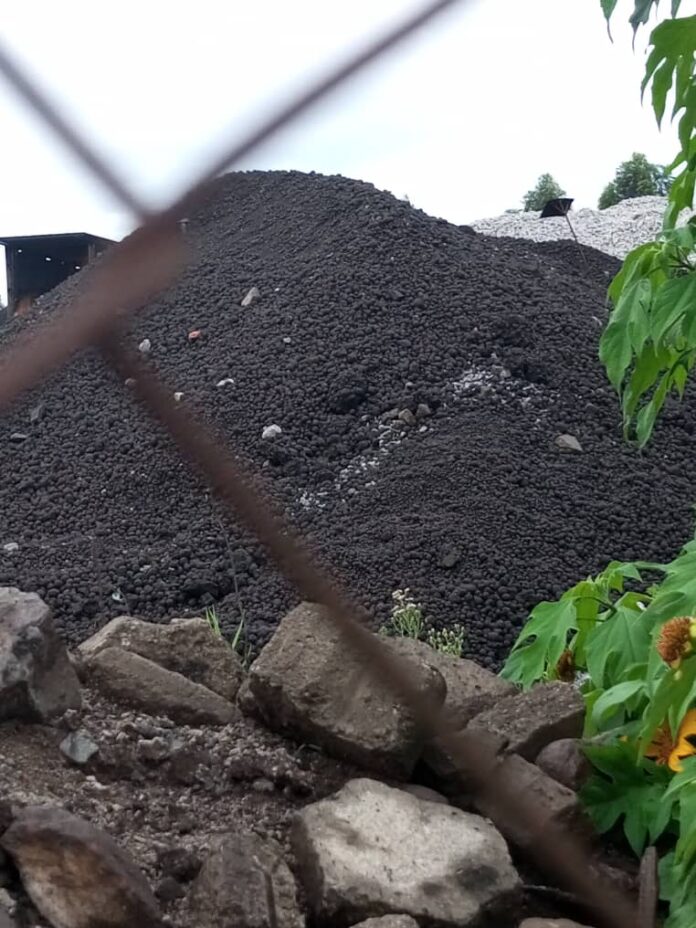MakanDay's latest report reveals differences over compensation among ex-workers, with the area MP stepping in.
By Charles Mafa & Linda Soko
Two camps have emerged among former Southern Africa Ferro Alloys Limited (SAFAL) workers who developed serious health conditions from prolonged manganese exposure—one demanding company-built houses and the other seeking cash compensation.
Initially, some ex-employees of the Indian-owned company, based in Kanona, 50 km east of Serenje in central Zambia, had engaged lawyers to help them secure fair compensation from their former employer. They were among 281 workers tested after experiencing symptoms such as loss of balance, impaired speech, loss of memory and excessive drooling.
Blood samples taken from 281 employees by the Occupational Health and Safety Institute (OHSI) at the time the disease was detected, revealed that 271 or 96.4% had manganese levels above normal.
The test results showed manganese levels ranging from 0.116 to 0.623 parts per million, with an average of 0.244 parts per million—significantly exceeding the normal range of 0.005 to 0.02 parts per million.
MP’s role in settlement talks
Since the disease was first reported in 2021, 27 affected workers have become critically ill, with some unable to speak. The health status of the other former workers who were tested alongside them remains unknown.
In a new development, Muchinga Constituency Member of Parliament Emmanuel Banda has stepped in to mediate between the former employees and SAFAL.
Banda clarified that his role was not imposed but was requested by some affected members who sought his intervention for fair compensation during a meeting held in Kanona, specifically for the company to build them houses.
“The meeting was held on 15th December, (2024), so in that meeting, I didn’t go alone. I made sure that Office of the President was present, Serenje Labour office was invited, office of the director health also, was also invited and in the same meeting there were also members of the community from within the community and there were also 12 patients,” he explained.
Additionally, Banda emphasised that he has kept the issue in the spotlight by repeatedly raising it in the National Assembly.
Some patients supported the idea but insisted the company should also provide startup capital, as their husbands could no longer provide for their families. Others preferred that those houses be built in their current locations rather than in Kanona.
The wife of one of the patients, who requested anonymity, said the company should provide a more reasonable amount given the severity of her husband’s illness.
“What’s even more frustrating is that SAFAL has said that once the houses are built, all support will end. These workers fell ill while serving the company, and it’s unfair to disregard their future needs,” she said.
While the Workers Compensation Fund Control Board began monthly payments in April 2024, ranging from K120 (US$4.3) to K670 (US$24), recipients and observers have deemed these amounts inadequate. The board also covers medical expenses and travel costs for hospital visits.
Some affected former workers, supported by lawyers, are seeking legal action against their former employer to secure fair compensation.
One of the law firms involved, Mosha and Company Legal Practitioners, initially offered free legal services to 26 patients. However, 22 who accepted SAFAL’s offer of housing have withdrawn from the legal process.
The law firm continues to represent four patients who believe SAFAL’s decision to offer housing came only after the lawyer’s involvement. The law firm explained that while they aim to negotiate reasonable compensation for the patients, SAFAL is trying to avoid court by negotiating directly with the affected individuals.
Mosha and Company clarified that they have not charged any legal fees and, if the case goes to court, SAFAL will cover all legal costs.
Earlier reports indicated that land for the houses had already been secured, but a visit by MakanDay to Kanona revealed that, although an emissary of the MP, an elected member of local government met with Chief Serenje’s advisor, the land has not yet been obtained from the traditional leadership.
“It is not clear if the land will be offered to SAFAL or the MP, because Chieftainess Serenje advised that she should be notified once the land is identified. The Chieftainess hasn’t visited, and I am yet to see the MP, who sent the councilor to me,” said Aswell Chituna, Chieftainess Serenje’s advisor for the Milulu area.
SAFAL remains operational despite allegations of causing irreversible health damage.
Despite the impact on worker health, SAFAL continues to operate, though it remains under scrutiny for its role in the disease’s outbreak and failure to meet environmental and safety regulations.
“Due to power deficits, the plant closed in June last year, but it will reopen in March,” said a source from Third Open Eye, the security company contracted to provide services at SAFAL.
According to the company’s website, some of the minerals that caused the brain-damaging disease are sold on the markets in Europe, America, Russia, and Southeast Asia.
A silent struggle
Another security officer directly employed by the company complained about the deteriorating health. The employee was among the 281 affected and tested when the disease was first detected.
“I feel very weak and suffer from frequent memory loss,” she said. “I don’t want to lose my job because if I do, who will take care of my child?”
Although still employed, the employee fears being dismissed—just like those who were fired after showing symptoms of the disease.
Tracking former employees has been challenging, as many have relocated to their home districts, while others—mostly uneducated—live in fear of reprisals if they speak out.
One such case is Nazario Soko, a Grade 12 graduate and one of the youngest victims, who has since moved to Eastern Province.
Among those MakanDay has been tracking since January 2023, is Keegan Mwelwa, 38, a father of four, who worked as a batcher at SAFAL for nearly eight years and was the first employee diagnosed with the disease in November 2021. When MakanDay first met him in February 2022, he could walk and talk, but now he struggles with daily tasks, experiencing difficulty walking and speaking.
Medical professionals highlight the long-term effects of exposure.
Dr. Dickson Munkombwe, a medical doctor at Levy Mwanawasa University Teaching Hospital, previously told MakanDay that manganism can develop through various exposure routes. Regardless of the source, excessive manganese accumulates in the brain, leading to the condition.
“Inhalation of manganese fumes, consumption of contaminated water, or ingestion of feeds with high manganese levels are common causes,” he explained.
“If the symptoms are irreversible, it is important to counsel patients so they understand that their condition is chronic and their baseline health will not improve significantly. Adaptation becomes crucial, which can be particularly challenging in cases of severe disability—especially when someone who was once healthy is now unable to walk,” he added.
In the case of SAFAL, the disease originated from ore feed—a fine manganese concentrate sourced from San He Mining Limited in Kabwe district. The ore was later processed into pellets mixed with 5% cement, generating high levels of dust fumes during smelting. Workers, who allegedly lacked proper protective gear, were potentially exposed to excessive manganese, particularly in the platform, tapping, and deck areas.
“SAFAL changed the type of manganese ore feed from March 9, 2022, to September 5, 2022,” said Tambatamba, in the National Assembly on March 9, 2023, on behalf of the health ministry.
On February 10, 2025, a patient admitted to Fairview Hospital, who requested anonymity, told MakanDay that 15 patients are currently receiving care at the facility, where they had been hospitalised for nearly three weeks. They have since been discharged and returned to their homes.
MP Banda, who later visited the patients upon their discharge, shared that the report from the attending doctor at Fairview Hospital was encouraging.
He explained that the doctor had identified a specific medicine that could be beneficial, although it had not yet been approved for use in Zambia. The hospital had, however, sought and received approval from the Zambia Medicines Regulatory Authority to import the drug.
Banda further noted that the doctor expected significant improvements if the medicine arrived within six months. He indicated that half of the patients were likely to make a full recovery, while others might take longer but would still show progress.
Deadly negligence
Before the outbreak of the manganism disease, the company was shut down for failing to meet environmental requirements. After resuming operations, the workers were exposed to this peculiar and apparently incurable disease, raising serious concerns about the role of the Zambia Environmental Management Agency (Zema) and the Ministry of Mines.
MakanDay has established that before the disease outbreak, Zema conducted an inspection and issued a compliance order to SAFAL, outlining several conditions. These included obtaining necessary authorisations under various laws, such as the Mines and Minerals Development Act and the Public Health Act, prior to project implementation.
The company was also required to implement occupational health and safety measures, provide personal protective equipment, and ensure regular medical checkups for employees—conditions that were allegedly ignored by SAFAL.
Zema has yet to respond to MakanDay’s request for comment, including questions about any action taken against the company, which remains in operation despite its role in causing the disease.
The company was also asked to comment on the latest developments, but none of its directors were available to provide a statement.

Discover more from MAKANDAY
Subscribe to get the latest posts sent to your email.



